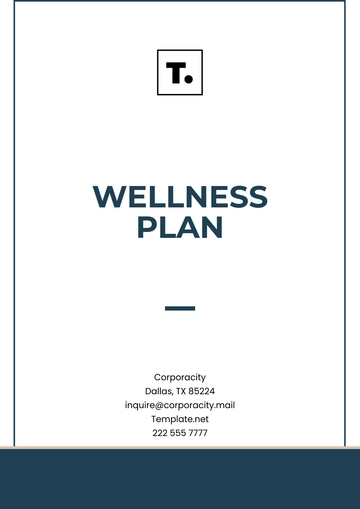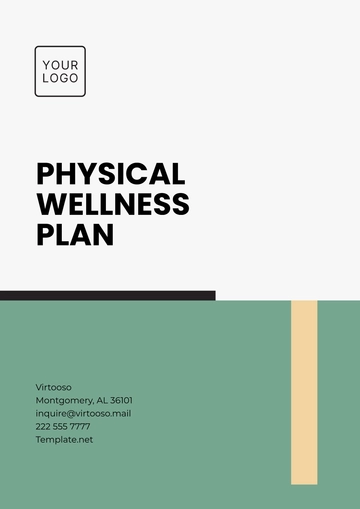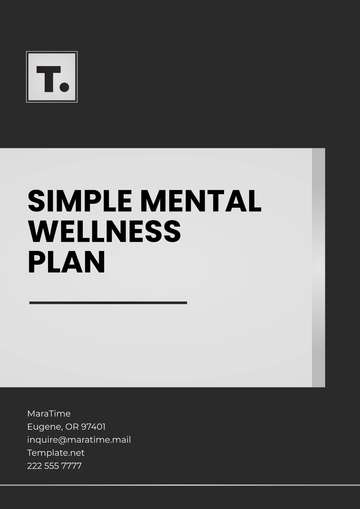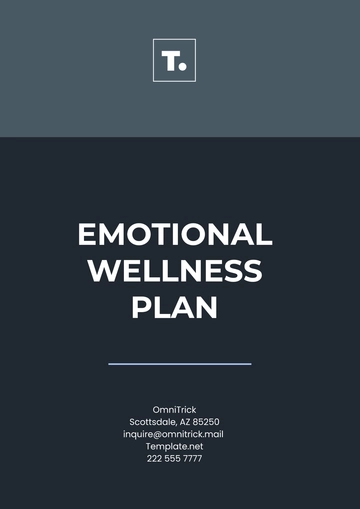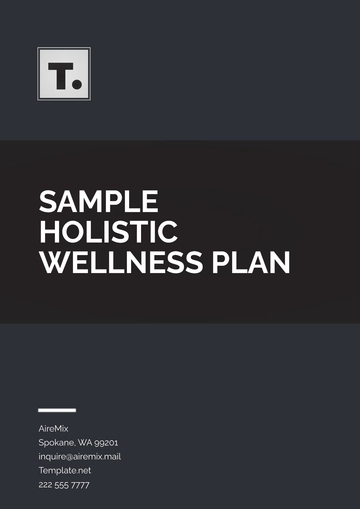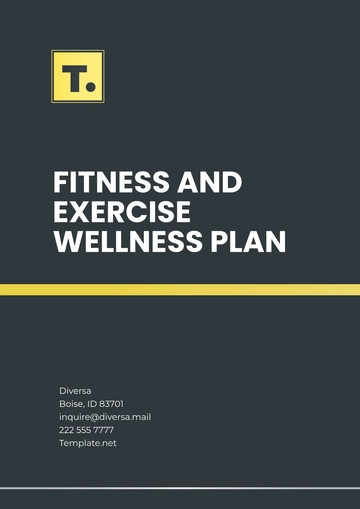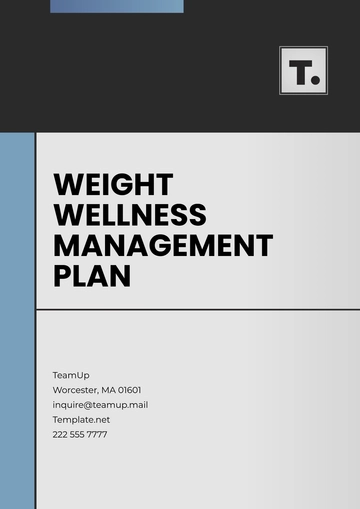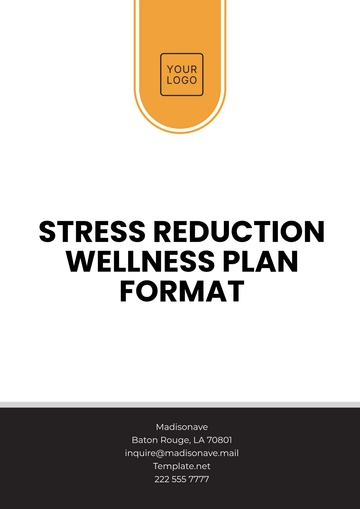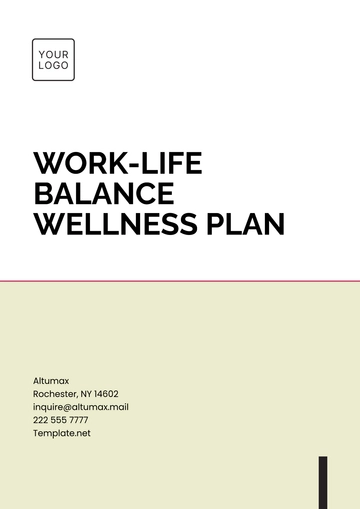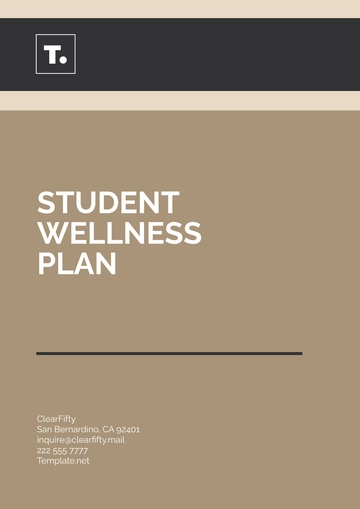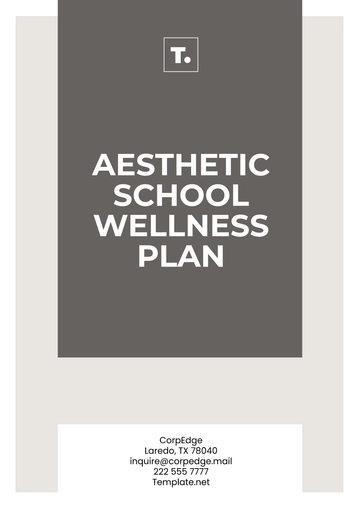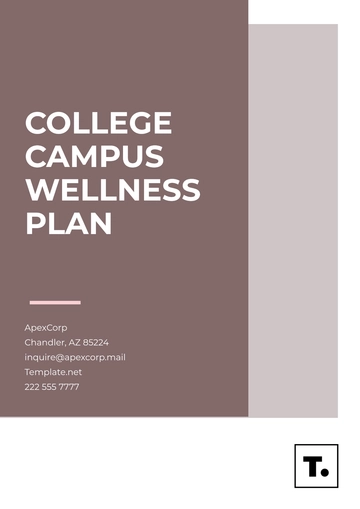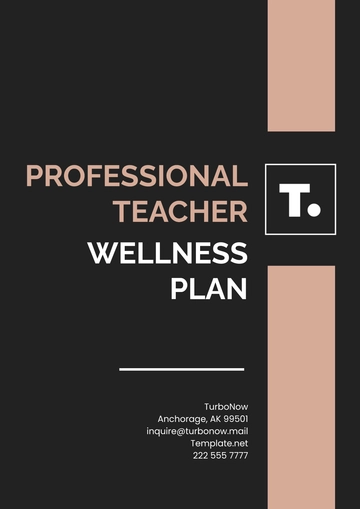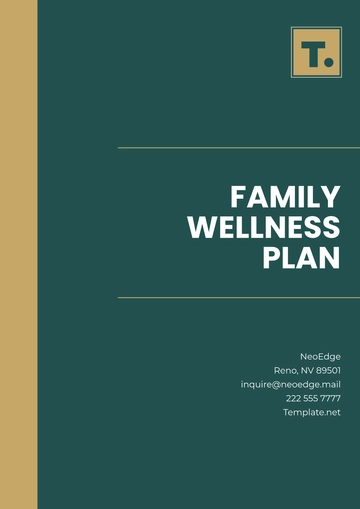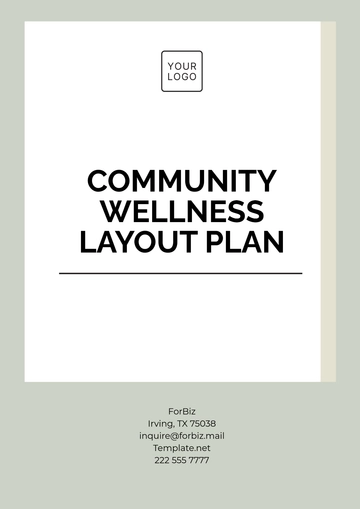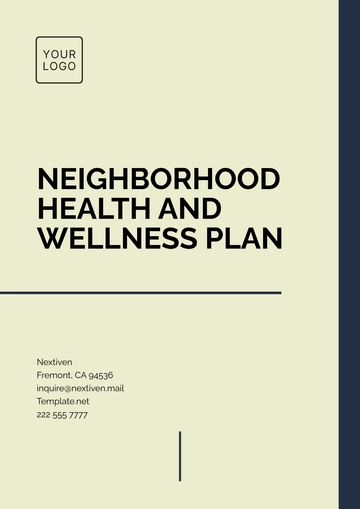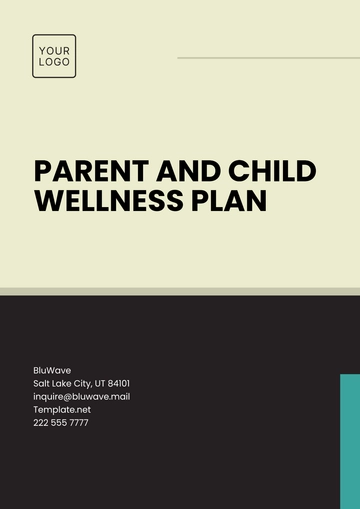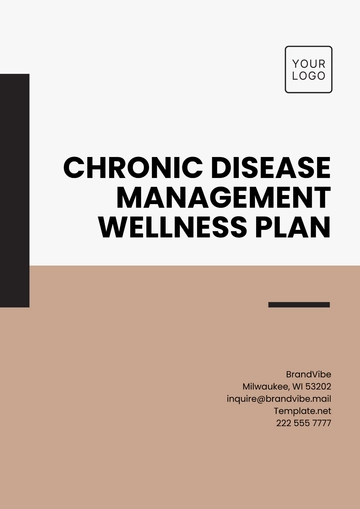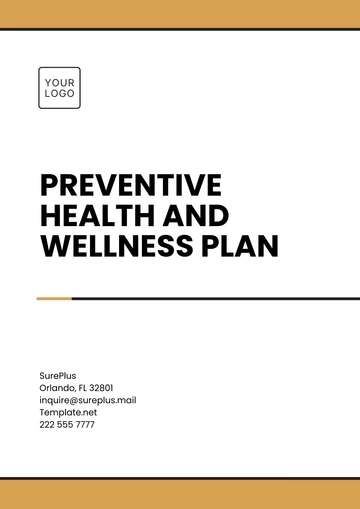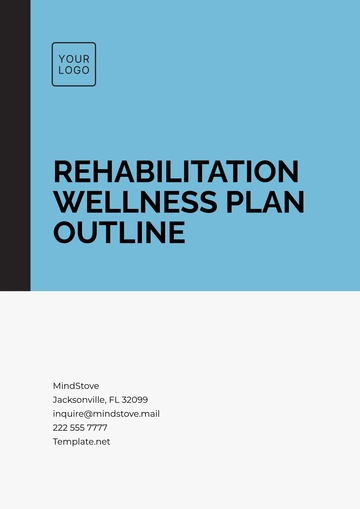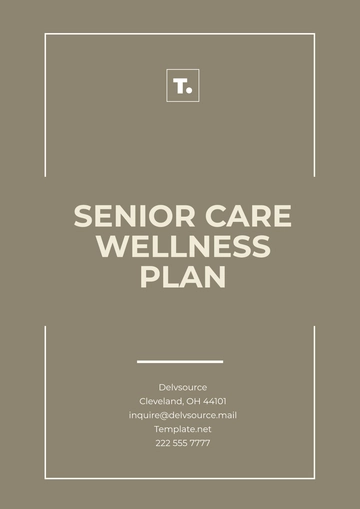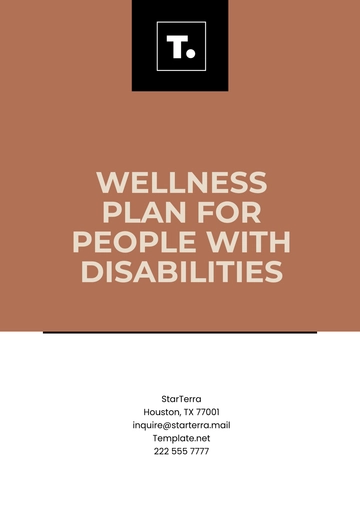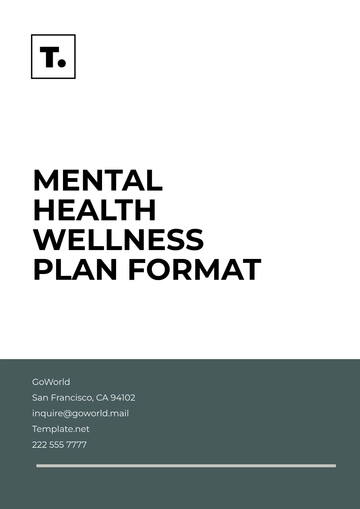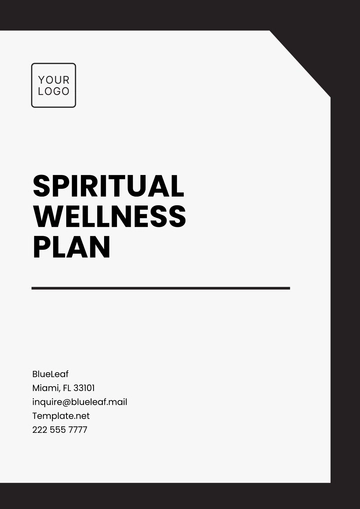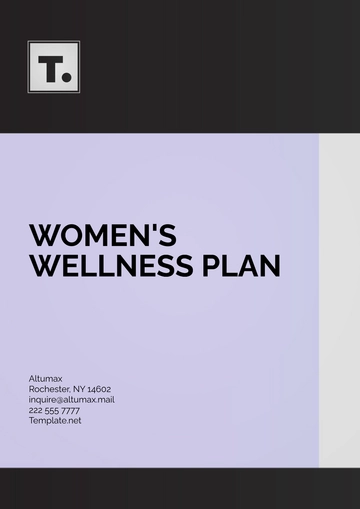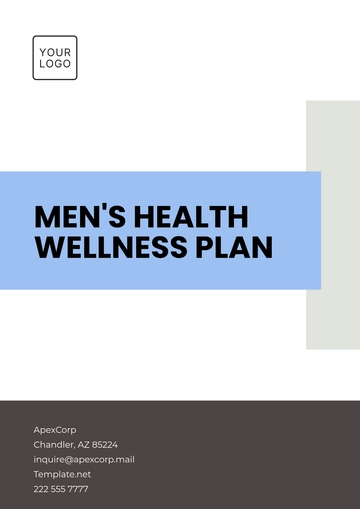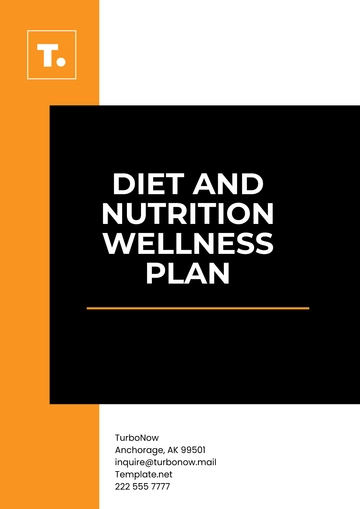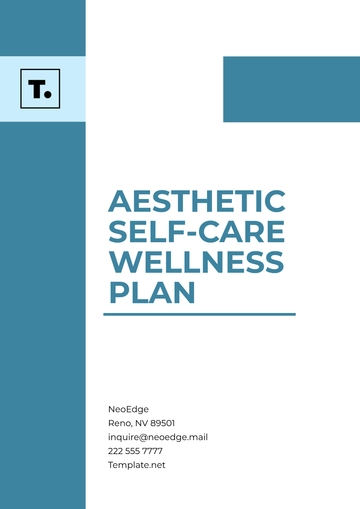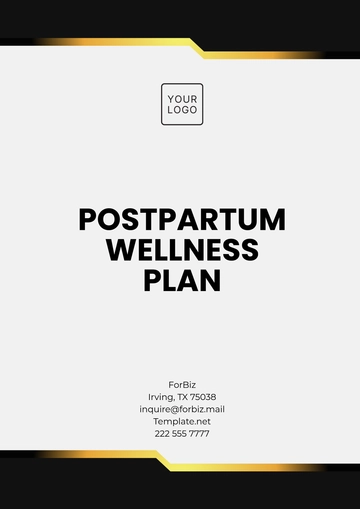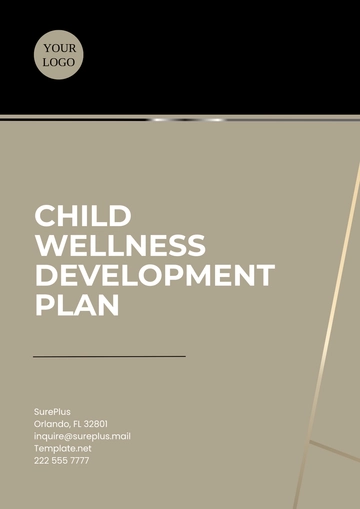Free Student Wellness Plan
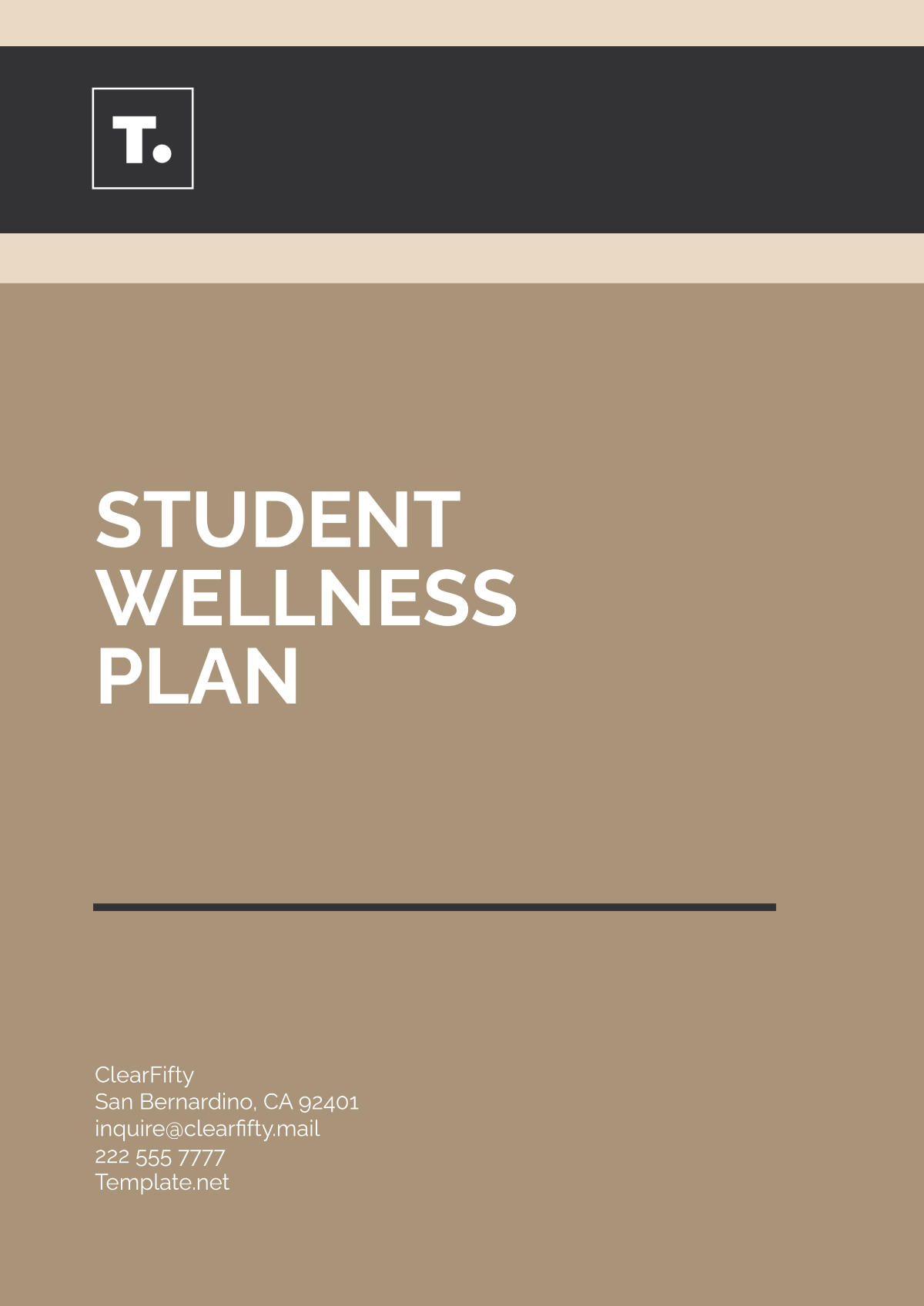
Prepared by: [Your Name]
Company: [Your Company Name]
Date: [Insert Date]
I. Introduction
The wellness of students is essential to their academic success, personal development, and overall quality of life. This Student Wellness Plan is designed to support students' physical, mental, emotional, social, and academic well-being. By promoting holistic wellness, this plan aims to create an environment that fosters personal growth, reduces stress, and helps students thrive both academically and personally.
II. Vision and Goals
Vision:
To create a comprehensive and supportive wellness program that enables students to balance their academic pursuits with physical health, emotional resilience, social connections, and personal growth.
Goals:
Support Physical Health: Promote fitness, healthy eating, and self-care routines to improve students' physical well-being.
Enhance Mental and Emotional Health: Provide resources to help students manage stress, anxiety, and other mental health challenges.
Foster Social Connections: Encourage community-building and social engagement to reduce isolation and build a sense of belonging.
Promote Academic Well-being: Offer resources and strategies to support students in managing academic pressures and maintaining a healthy study-life balance.
Develop Life Skills: Provide opportunities for students to develop skills related to time management, financial literacy, and personal development.
III. Key Areas of Focus and Strategies
A. Physical Wellness
Strategies:
Fitness Programs: Offer a variety of fitness classes (e.g., yoga, pilates, strength training) and access to the campus gym to encourage physical activity.
Healthy Eating Options: Provide access to nutritious food options on campus, including fruits, salads, and healthy snacks in dining facilities and vending machines.
Sleep Education: Organize workshops to educate students about the importance of sleep and healthy sleep habits for optimal functioning and academic performance.
Health Screenings: Offer free or subsidized health screenings, including flu shots, blood pressure checks, and mental health assessments.
Physical Activity Challenges: Host wellness challenges (e.g., step challenges, fitness contests) to motivate students to stay active and compete in a fun, supportive environment.
B. Mental and Emotional Health
Strategies:
Counseling Services: Provide access to on-campus counseling services, offering individual, group, and crisis counseling to support students' mental health needs.
Mindfulness and Meditation Programs: Offer mindfulness and meditation sessions to help students manage stress and enhance focus and well-being.
Stress Management Workshops: Organize workshops on time management, relaxation techniques, and how to cope with academic pressures and life stressors.
Peer Support Groups: Establish peer-led support groups for students to share experiences and support each other through common challenges such as anxiety, homesickness, or academic stress.
Digital Mental Health Resources: Provide online tools and apps for mental wellness, such as mental health screening tools and mindfulness practices.
C. Social Wellness
Strategies:
Community Building Activities: Organize social events such as welcome parties, movie nights, and cultural celebrations to help students connect and build friendships.
Student Organizations: Support a wide range of student organizations, clubs, and societies to help students find like-minded peers and engage in social, cultural, or academic interests.
Campus Mentorship Programs: Pair new students with upperclassmen or faculty mentors to help ease their transition into college life and foster long-term relationships.
Support Diversity and Inclusion: Promote initiatives that celebrate diversity and inclusion, ensuring that all students feel welcomed, valued, and supported on campus.
Social Media Engagement: Create online communities through social media platforms to help students stay connected and informed about campus events, wellness resources, and support systems.
D. Academic Well-being
Strategies:
Time Management Workshops: Offer workshops and resources on managing academic workloads, setting realistic goals, and maintaining a healthy study-life balance.
Tutoring and Study Support: Provide access to academic tutoring, study groups, and peer-assisted learning services to help students succeed in their coursework.
Exam Preparation Support: Offer workshops on effective exam preparation, including tips on time management, study strategies, and stress reduction.
Counseling for Academic Stress: Provide counseling support for students experiencing academic burnout, helping them manage stress and remain motivated throughout the semester.
Academic Flexibility: Encourage professors and faculty to offer flexibility regarding deadlines and assignments for students experiencing personal or academic stress.
E. Life Skills Development
Strategies:
Financial Literacy Programs: Offer workshops on budgeting, managing student loans, saving money, and preparing for post-graduation financial challenges.
Career Development Services: Provide career counseling, resume workshops, internship placement support, and job search strategies to prepare students for life after graduation.
Personal Development Workshops: Offer workshops on leadership development, communication skills, self-care routines, and goal-setting.
Health Education Campaigns: Run educational campaigns about sexual health, substance abuse prevention, and safe practices regarding alcohol and drugs.
Time Management and Organization: Provide tools and resources to help students stay organized with their academic and personal responsibilities.
IV. Implementation Plan
Roles and Responsibilities:
Wellness Committee: Responsible for overseeing the implementation, monitoring, and evaluation of wellness programs.
Campus Leadership: Provide support and resources for wellness initiatives, ensuring that programs are integrated into the institution's culture and operations.
Students: Actively participate in wellness programs, engage in self-care practices, and provide feedback on the effectiveness of the wellness services offered.
Timeline:
Phase 1 (Month 1-3): Conduct a wellness needs assessment. Launch mental health and physical wellness programs, including counseling and fitness sessions.
Phase 2 (Month 4-6): Begin community-building activities, promote student organizations, and host workshops on time management and stress reduction.
Phase 3 (Month 7-12): Expand wellness offerings, evaluate program effectiveness, and assess student satisfaction and participation.
V. Measurement and Evaluation
Key Performance Indicators (KPIs):
Student Participation: Track attendance and engagement in wellness programs, workshops, and activities.
Mental Health Improvement: Measure the number of students seeking counseling services and track changes in stress and well-being scores.
Academic Success: Monitor academic performance, including GPA, retention rates, and feedback on academic support services.
Physical Health Metrics: Track student participation in physical wellness activities and offer periodic health screenings to assess improvement in overall health.
Evaluation Methods:
Student Surveys: Regular surveys to gather feedback on the effectiveness and impact of wellness programs.
Focus Groups: Hold focus groups with students to discuss specific needs and gather detailed insights into the wellness experience.
Annual Wellness Report: A comprehensive report on the outcomes of wellness initiatives, student satisfaction, and recommendations for future improvements.
VI. Sustainability Plan
Ongoing Funding: Secure funding through campus-wide initiatives, partnerships with local businesses, or alumni donations to sustain wellness programs.
Student Involvement: Encourage student leadership in wellness programs to ensure that initiatives remain relevant and tailored to the evolving needs of the student body.
Adaptation to Needs: Continuously evaluate and adapt wellness programs based on student feedback, changing trends, and emerging wellness research.
Collaboration with Campus Partners: Build strong partnerships with academic departments, student organizations, and community groups to expand the reach and impact of wellness initiatives.
VII. Conclusion
The Student Wellness Plan is designed to create a comprehensive and holistic approach to support students’ well-being. By focusing on physical, mental, emotional, social, and academic wellness, this plan ensures that students have the resources and support they need to succeed in all aspects of their lives. With a commitment to ongoing evaluation and improvement, this plan aims to build a thriving campus community where students are empowered to achieve their full potential.
- 100% Customizable, free editor
- Access 1 Million+ Templates, photo’s & graphics
- Download or share as a template
- Click and replace photos, graphics, text, backgrounds
- Resize, crop, AI write & more
- Access advanced editor
You may also like
- Finance Plan
- Construction Plan
- Sales Plan
- Development Plan
- Career Plan
- Budget Plan
- HR Plan
- Education Plan
- Transition Plan
- Work Plan
- Training Plan
- Communication Plan
- Operation Plan
- Health And Safety Plan
- Strategy Plan
- Professional Development Plan
- Advertising Plan
- Risk Management Plan
- Restaurant Plan
- School Plan
- Nursing Home Patient Care Plan
- Nursing Care Plan
- Plan Event
- Startup Plan
- Social Media Plan
- Staffing Plan
- Annual Plan
- Content Plan
- Payment Plan
- Implementation Plan
- Hotel Plan
- Workout Plan
- Accounting Plan
- Campaign Plan
- Essay Plan
- 30 60 90 Day Plan
- Research Plan
- Recruitment Plan
- 90 Day Plan
- Quarterly Plan
- Emergency Plan
- 5 Year Plan
- Gym Plan
- Personal Plan
- IT and Software Plan
- Treatment Plan
- Real Estate Plan
- Law Firm Plan
- Healthcare Plan
- Improvement Plan
- Media Plan
- 5 Year Business Plan
- Learning Plan
- Marketing Campaign Plan
- Travel Agency Plan
- Cleaning Services Plan
- Interior Design Plan
- Performance Plan
- PR Plan
- Birth Plan
- Life Plan
- SEO Plan
- Disaster Recovery Plan
- Continuity Plan
- Launch Plan
- Legal Plan
- Behavior Plan
- Performance Improvement Plan
- Salon Plan
- Security Plan
- Security Management Plan
- Employee Development Plan
- Quality Plan
- Service Improvement Plan
- Growth Plan
- Incident Response Plan
- Basketball Plan
- Emergency Action Plan
- Product Launch Plan
- Spa Plan
- Employee Training Plan
- Data Analysis Plan
- Employee Action Plan
- Territory Plan
- Audit Plan
- Classroom Plan
- Activity Plan
- Parenting Plan
- Care Plan
- Project Execution Plan
- Exercise Plan
- Internship Plan
- Software Development Plan
- Continuous Improvement Plan
- Leave Plan
- 90 Day Sales Plan
- Advertising Agency Plan
- Employee Transition Plan
- Smart Action Plan
- Workplace Safety Plan
- Behavior Change Plan
- Contingency Plan
- Continuity of Operations Plan
- Health Plan
- Quality Control Plan
- Self Plan
- Sports Development Plan
- Change Management Plan
- Ecommerce Plan
- Personal Financial Plan
- Process Improvement Plan
- 30-60-90 Day Sales Plan
- Crisis Management Plan
- Engagement Plan
- Execution Plan
- Pandemic Plan
- Quality Assurance Plan
- Service Continuity Plan
- Agile Project Plan
- Fundraising Plan
- Job Transition Plan
- Asset Maintenance Plan
- Maintenance Plan
- Software Test Plan
- Staff Training and Development Plan
- 3 Year Plan
- Brand Activation Plan
- Release Plan
- Resource Plan
- Risk Mitigation Plan
- Teacher Plan
- 30 60 90 Day Plan for New Manager
- Food Safety Plan
- Food Truck Plan
- Hiring Plan
- Quality Management Plan
- Wellness Plan
- Behavior Intervention Plan
- Bonus Plan
- Investment Plan
- Maternity Leave Plan
- Pandemic Response Plan
- Succession Planning
- Coaching Plan
- Configuration Management Plan
- Remote Work Plan
- Self Care Plan
- Teaching Plan
- 100-Day Plan
- HACCP Plan
- Student Plan
- Sustainability Plan
- 30 60 90 Day Plan for Interview
- Access Plan
- Site Specific Safety Plan
